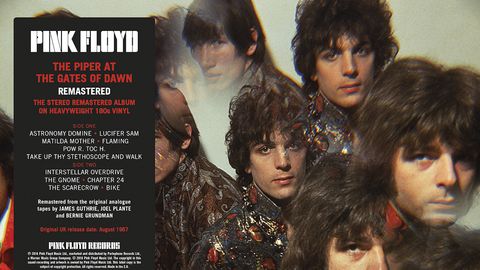Alongside Joy Division’s transformation into New Order, Pink Floyd’s first four albums – re-pressed for the first time in 20 years on 180g vinyl – marked one of rock’s great transitions. Their 1967 debut Piper At The Gates Of Dawn (9⁄10) was Syd Barrett’s madcap masterpiece, omitting their more coherent singles See Emily Play and Arnold Layne to showcase his sprawling, dribbling, star-clutching psychedelic miasma of voodoo blues, music hall, The Beatles, pagan folk and backwards ragas. Thanks to its acid-driven experimentations, it came to epitomise the psychedelic era and inspire later generations.
But as the adorably wonky-wheeled Bike collapsed into a cacophony of crazed clockwork and psychotic ducks, omens reared. Come 1968’s Saucerful Of Secrets (8⁄10), Barrett’s acid-casualty behaviour had become so erratic – detuning his guitar mid-gig and melting Brylcreem down his face – that he was ousted in favour of David Gilmour.
Largely Syd-less, Floyd developed their expansive prog feel under Roger Waters’s leadership: Corporal Clegg previewed the grandiose operetta of The Wall’s The Trial (but with more kazoos), Set The Controls For The Heart Of The Sun was a dark, motorik foretelling of their paranoid masterpiece Dark Side Of The Moon, and the title track was a blueprint for their future multi-part meanders, the sound of a drummer, guitarist and piano player having psychiatric breakdowns until, in the closing minutes, they’re miraculously cured by Zeus.
Barrett’s only song here, Jugband Blues, sounded lost – ‘I’m wondering who could be writing this song’ – but it was his bandmates who would spend their next few albums floundering for identity. Their soundtrack for Barbet Schroeder’s 1969 film More (6⁄10) found them alternating folk ballads (e.g. Cirrus Minor) with brutal blues batteries (The Nile Song, Ibiza Bar), and the same year’s double album Ummagumma (5⁄10) was the ultimate indulgence – one impressive live LP compiling their extended avant-garde pieces, and a second LP on which the four members took a side each to create an elaborate solo work.
Cue Wright’s Sysyphus suite resembling Rachmaninoff being attacked by rabid monkeys, Waters recreating a ferret rave and Gilmour self-confessedly “bullshitting” through The Narrow Way (Parts 1-3). It would take more honing to flog 50 million Dark Sides; this is prog’s emperor butterfly in its pupae stage.


